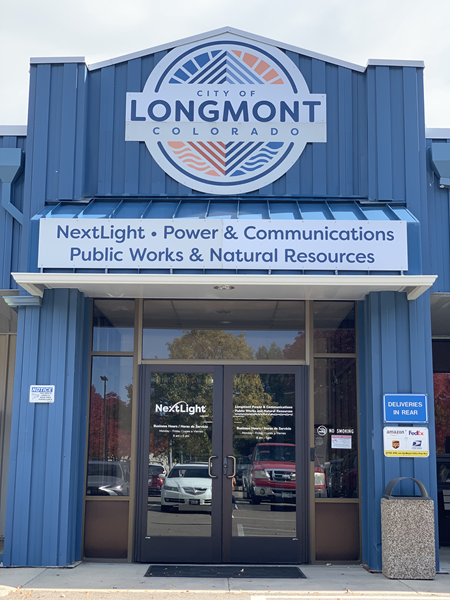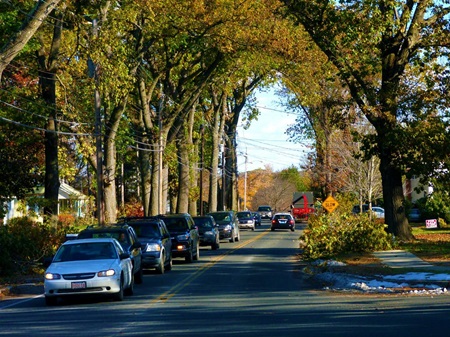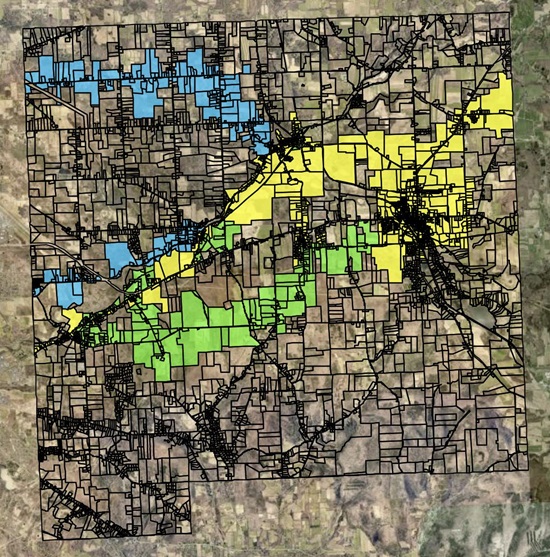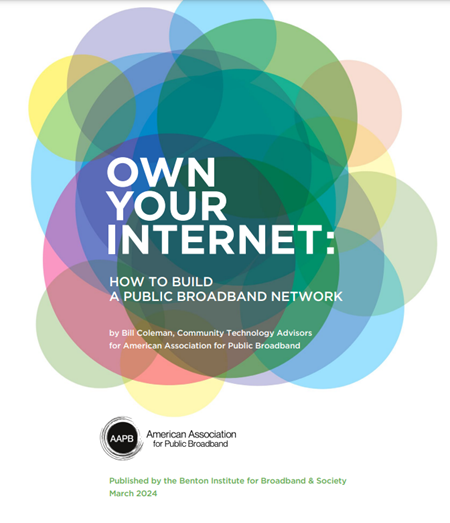
Fast, affordable Internet access for all.

Since it first broke ground in 2014, Longmont, Colorado’s community-owned NextLight fiber network has won numerous awards and inspired countless communities nationwide.
With its citywide deployment nearing completion, and counterproductive state legal restrictions in the rear view mirror, city leaders are now working to expand the network beyond city limits.
City officials tell ILSR that network construction has now crossed north of Colorado Highway 66, outside of city limits and into the Anhawa and Strawberry Circle neighborhoods. The extension will bring service to around 125 homes that previously had access to Longmont electrical utility service, but not broadband.
Longmont officials say this latest expansion is being financed entirely by subscriber revenues and money set aside for capital projects, with no bonding or other supplementary funds involved.

“We’ve been carefully evaluating our opportunities for expansion in order to make best use of the community’s resources,” NextLight’s Scott Rochat told ILSR. “Our total investment in this project is just under $300,000; based on our typical rate of adoption, we expect to see about a five-year payback. This also has the benefit of giving us a foothold on the north side of (Highway) 66 to help facilitate more expansion in the future.”
West Springfield residents recently gathered to break ground on a plan to deliver affordable fiber access to all 28,000 city residents. The effort, first conceived in 2021 during the height of the pandemic, involves working with Westfield Gas and Electric's broadband subsidiary Whip City Fiber to deliver symmetrical gigabit fiber.
Whip City only currently offers residential customers one tier of service: symmetrical gigabit fiber for $75 a month. A recent OpenVault report found that the percentage of subscribers on gigabit speed tiers grew 29 percent last year, with one-third of subscribers now provisioned for gigabit speeds. Whip City users can also access phone service for an additional $20 a month.
The first subscribers should be lit up for service by the end of this year, officials say. It’s the culmination of a project that began in 2019 when city officials first considered the construction of a city-owned broadband network; emboldened in 2020 after city leaders and locals alike became frustrated by Comcast’s implementation of technically unnecessary and punitive usage caps.

In 2021 West Springfield voted to establish a public utility department tasked with creating a town-owned fiber-optic cable network. They urged locals to sign up for a $1.5 million pilot program in four local neighborhoods, and submitted applications to Verizon and Eversource to ensure access to utility poles to begin “make ready” fiber attachment preparations.

In this latest episode of the podcast, Christopher is joined by Curtis Dean, Vice President of the Community Broadband Action Network (CBAN), to delve into the state of broadband in Iowa and the impactful work undertaken by CBAN.
Fresh insights into Iowa's broadband landscape are unveiled as Curtis sheds light on the hurdles faced by local providers in securing funding and navigating regulatory frameworks. Drawing parallels with successful municipal broadband endeavors like the one in Fort Dodge, Chris and Curtis emphasizes the pivotal role of local control in driving broadband expansion initiatives.
The episode also serves as a platform for Curtis to announce upcoming events within the broadband community, including the eagerly anticipated CBAN Spring Summit and the Iowa Association of Municipal Utilities Municipal Broadband Conference, fostering collaboration and knowledge-sharing among stakeholders.
As the conversation concludes, listeners gain a deeper understanding of the collaborative spirit driving Iowa's municipal broadband community and the imperative of empowering local, community-focused providers in the quest for equitable broadband access.
This show is 30 minutes long and can be played on this page or using the podcast app of your choice with this feed.
Transcript below.
We want your feedback and suggestions for the show: please e-mail us or leave a comment below.
Listen to other episodes here or see other podcasts from the Institute for Local Self-Reliance here.
Thanks to Arne Huseby for the music. The song is Warm Duck Shuffle and is licensed under a Creative Commons Attribution (3.0) license.
Language added to a New York State budget bill is threatening to undermine a municipal broadband grant program established by Gov. Kathy Hochul’s office earlier this year.
Known as the Municipal Infrastructure Program, it was designed to provide grant funding for municipalities in the state eager to build publicly-owned, locally controlled broadband infrastructure as a way to ensure ubiquitous, affordable access to high-quality Internet after decades of frustration with expensive, spotty and uneven service from the regional monopolies.
Currently, New York state lawmakers are in the midst of budget proposal season in which the Governor’s office and both legislative chambers (the state Senate and Assembly) have until April 1 to reconcile and complete a final budget for the upcoming fiscal year.
Buried near the bottom of the Assembly budget proposal (A8805B) is a Trojan horse legislative sources say is being pushed by lobbyists representing Charter Spectrum, the regional cable monopoly and 2nd largest cable company in the U.S. that was nearly kicked out of New York by state officials in 2018 for atrocious service.
A new documentary, produced by the Vermont production company Well Told Films and the Vermont Community Broadband Board (VCBB), tells the uplifting story of how community-minded Vermonters came together to solve a common challenge: the lack of high-speed Internet connectivity across the Green Mountain State.
“Connected: Vermont’s Grassroots Effort for Rural Broadband” recently premiered at the Capitol Theater in Montpelier, giving viewers a front-row seat at how hundreds of volunteers (and later state leaders) rallied around the emergence of Communications Union Districts (CUDs) as the state's primary vehicle to bring high-quality Internet service to every resident and business in one of the most rural states in the nation.
The 35-minute film brings to life the story of how a community-based solution to solving the digital divide in Vermont came to be, while showcasing all of the progress that's been made since ECFiber, the state's first CUD, was established in 2007.
It begins with the celebration of ECFiber completing its fiber-to-the-home (FTTH) network last year, an event at which U.S. Sen. Peter Welch succinctly summarized why the community broadband movement in Vermont was, and is, necessary:
"All this started with what at the time was really a radical idea – that if we in rural Vermont were going to depend on the big telecommunication companies to wire our homes to get us Internet, we'd be waiting until our grandchildren had grandchildren."

In the latest episode of the podcast, Christopher reunites with Ry Marcattilio and Sean Gonsalves to tackle the conclusion of the Affordable Connectivity Program (ACP) and the pressing need for sustainable solutions to internet affordability across the United States.
Fresh from the recent Building for Digital Equity (B4DE) Event, this discussion zeroes in on internet affordability, shedding light on successful models and strategies employed by community-owned broadband networks in various municipalities. Examples from Pharr, Texas, and Chattanooga, Tennessee, illustrate effective approaches to providing affordable internet access within local communities.
Wrapping up the conversation are updates on recent developments, including the FCC's redefinition of broadband, the expansion of Longmont's municipal network in Colorado, and a sneak peek into an upcoming podcast episode covering the recent Tribal Broadband Bootcamp held at RantanenTown Ranch in Southern California.
This show is 25 minutes long and can be played on this page or using the podcast app of your choice with this feed.
Transcript below.
We want your feedback and suggestions for the show: please e-mail us or leave a comment below.
Listen to other episodes here or see other podcasts from the Institute for Local Self-Reliance here.
Thanks to Arne Huseby for the music. The song is Warm Duck Shuffle and is licensed under a Creative Commons Attribution (3.0) license.
In a recently published piece in The American Prospect, Sean Gonsalves, ILSR's Community Broadband Networks Initiative Associate Director for Communications, reports on four cities across the U.S. that are well prepared to deal with the demise of the Affordable Connectivity Program (ACP).
The article – titled "The Municipal Broadband Solution" – begins by laying out why Congress created the popular program and how letting the ACP go bankrupt undermines the national "Internet For All" Initiative now underway. However, while digital equity advocates across the nation rightly lament the demise of the program, the focus of the article is on cities that have figured out how to deliver afforable high-quality Internet access even without the ACP.
Here's a few excerpts:
Congress created the ACP to soften a harsh reality: Americans pay among the highest prices for broadband of any developed nation in the world, leaving tens of millions unable to afford internet service—something experts have long noted is a telltale sign of a broken market dominated by monopoly providers, and is at the very heart of why the U.S. digital divide is as massive as it is.
However, although federal lawmakers have known for over a year that the fund would be bankrupt by this spring, GOP congressional leaders have not budged on even bipartisan attempts to save the ACP, prompting the Federal Communications Commission (FCC) to announce in January that the agency was being forced to wind down the popular program.
It’s a major setback for the “Internet for All” effort, especially in light of a recent FCC survey that found 29 percent of ACP beneficiaries would be left without any home internet service whatsoever without the benefit, in an age when internet connectivity is a necessity for meaningful participation in 21st-century society.
One year after launching a municipal fiber network, Dryden, NY officials say they’re making steady progress in their quest to expand affordable fiber broadband to the entire town of 14,500.
While the effort hasn’t been without obstacles, town leaders say the public response to their foray into broadband has been overwhelmingly positive.
“While there are challenges, we are continuing to make great progress in the buildout,” Dryden Town Supervisor Jason Leifer tells ILSR. “We have support from our residents, who continue to show interest in this project. We also have financial support from Tompkins County in the form of grants–and from neighboring municipalities who are interested in replicating our model.”
The city’s network began with a 50-home trial pilot trial in the southwest part of town. The broader $15 million network will be funded by a combination of bonds, $2 million in federal COVID-19 disaster relief funding, an Appalachian Regional Commission grant, and eventually, subscriber revenues.

The town took a phased approach to deployment, first by connecting the backbone of the network in the southeast of the city, followed by a focus on the western and eastern halves of the municipality, respectively. The Dryden fiber website features a build map that helps locals track network progress.
“We have currently passed over 420 addresses with our buildout,” freshly-appointed Dryden Fiber Executive Director David Makar tells ISLR. “This includes over 150 rental properties – mostly single family homes and apartments – as well as many owner occupied homes and businesses. We are still in phase one, and as we move into the village of Dryden and the hamlets of Varna, Ellis Hollow, and Etna, we will be in phase two.”
More cities and towns across the U.S. are exploring municipal broadband as an increasingly attractive and effective approach to bring ubiquitous, and affordable, high-speed Internet to its residents and businesses.
Now, a new handbook has been published that is tailored to guide local officials in navigating the logistical, technical, financial, and political challenges along the way.
Hot off the presses this week comes “Own Your Internet: How To Build A Public Broadband Network” – a project of the American Association for Public Broadband (AAPB), published in partnership with the Benton Institute for Broadband & Society.

“This handbook is a key part of AAPB's strategy to double the number of public networks in the next five years, supporting communities in leveraging these networks for economic development, smart city initiatives, and attracting new residents," AAPB Executive Director Gigi Sohn said in announcing the handbook release.
Benton Executive Director Adrianne B. Furniss said the collaboration in publishing the guide made sense because “every community has a stake in this broadband moment—and they must have the tools they need to decide how they will meet their connectivity needs. We trust that this handbook is one of many tools communities will use to assess their situation and plan for a connected future.”
After years of planning, Edison, New Jersey officials are moving forward on a municipal fiber plan built on the back of a $2 million American Rescue Plan Act (ARPA) grant. While the funding was originally announced last summer by state leaders, city officials only just passed a resolution last week accepting the grant.
Edison residents have long complained of a local broadband monopoly at the hands of Optimum, resulting in spotty access, slow speeds, and high prices. While Edison wants to break the competitive logjam, the full cost and scope of Edison’s as-yet-unfinished plan remains unclear.
Edison spent $36,750 on a feasibility study in 2022 to determine the plausibility of building a citywide fiber network. The resulting study by Matrix Design Group found that 87 percent of Edison locals would likely switch to a city-owned and operated fiber network if the option existed.
"Ending Optimum’s monopoly in Edison is a high priority," Edison Mayor Sam Joshi wrote on Instagram and Facebook shortly after the study was published, calling it "a step towards internet freedom."